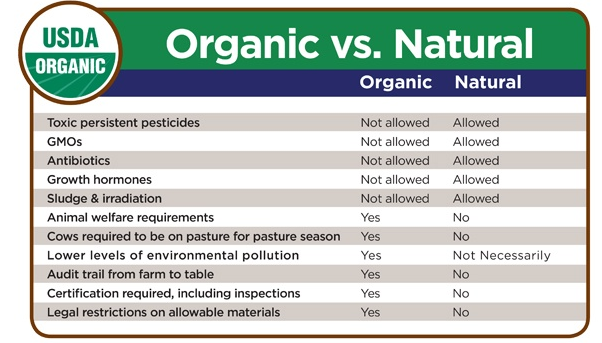Organic food is cultivated using organic practises of farming that keep the fragile eco – system in mind. Organic farming is carried out using methods that does not promote the use of Genetically Modified Organism’s (GMO’s), chemical fertilizers & pesticides but instead relies on traditional ways of farming giving us safer and more nutritious food. This not only ensures good health but also gives the farmer a more sustainable option.
There is a misnomer about what the real attributes of Organic Food are. Organic Food is sometimes confused with naturally grown food. The table below from United States Department of Agriculture (USDA) gives a detailed comparison of what the two terms actually mean. A product can be grown with toxic pesticides and injected with growth hormones, and still be called natural.
The benefits of consuming organic food are several: –
- Prevents exposure of the consumer to harmful and possibly cancer causing chemical residues in our grams, cereals, fruits, veggies and dairy products.
- Since Organic food is pure and natural it helps in boosting immunity and helps vitalize body and mind
- No loss in nutritional value by caused by processing food e.g.: polished rice and dals.
- Helping create a cleaner ground water table due to the non-use of excessive pesticides and fertilizers.
- Help in creating a sustainable cycle of livelihoods for the farmers.
- Help protect and conserve the Earth, it is our home.
Organic food may appear to be costly, but paying a little extra comes back to you in many ways, benefiting you and your family with good health, as well as the ecosystem
- Most organic farms do not utilize mechanization to grow, harvest or process foods, and therefore is a labour intensive process that offers employment to more individuals.
- The yield of crops, obtained in organic farms per acre is lesser compared to conventional farms as chemical fertilizers are not used. For the same reasons time for cultivation in organic farms is also higher.
- Many farmers employ crop rotation as a means to enrich soil nutrition, in doing so they ensure that the soil remains sustainable source of nutrition, but this reduces the yield of the main crop when compared to conventional farming.
- The supply of organic food is much less when we look at the demand. If we look at India, less than 1% of the total cultivable land actually produces organic food.
- Organic farming Certification is a costly affair, certifying bodies conduct annual checks, audit farms and certify a farm as organic only if satisfies all the norms. This is usually a costly affair, which ensures the farmer produces organic food keeping the safety and ecological balance in mind.
To have certified organic agricultural products, means that the product has been certified to meet specific standards and regulations set by the National Organic Program (NOP).
We try and procure from Certified Organic farmers who are mostly certified by bodies like India Organic, IMO Control, IndoCert etc.
All our other farmers generally follow old time natural farming practises using Organic Manure and other natural farm inputs.
We strive hard to connect with farmers who carry Organic Certifications for their farms and produce. Our best effort is to procure organic produce from such farmers.
We also however work with farmers and cooperative societies from rural parts of India who do not have organic certifications. They cultivate crops using traditional organic practises without the use of chemicals or fertilizers which have remained unchanged for many generations. We mainly want to bring out such products from the forgotten and often neglected farmers into the public light.

